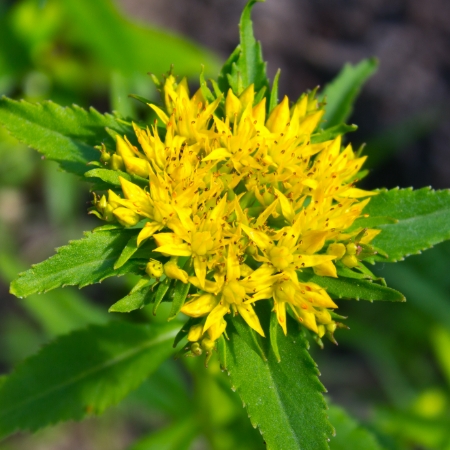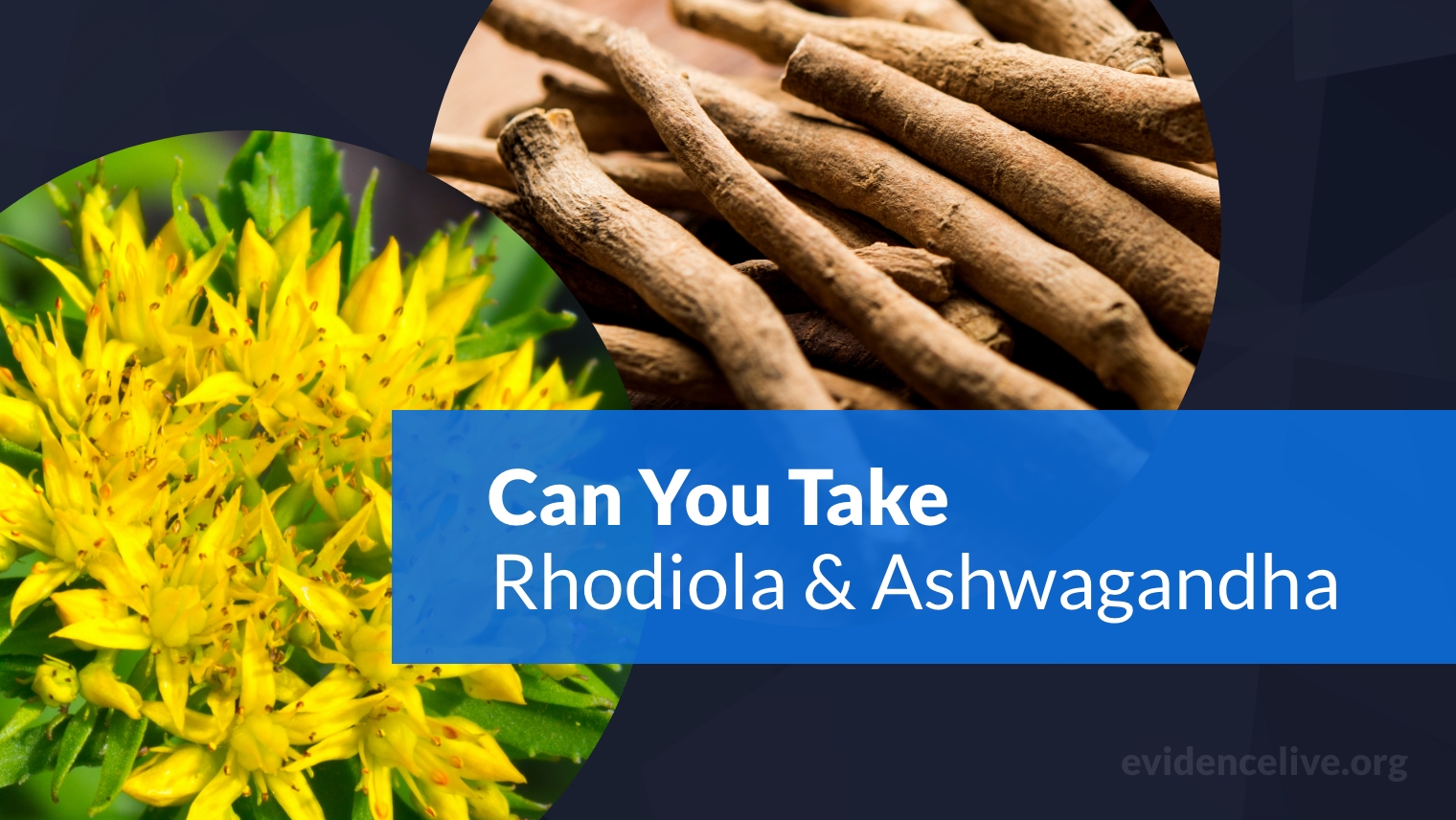Ashwagandha and Rhodiola are two very effective adaptogens often used together for optimal mental benefits.
People take Ashwagandha for its adaptogenic properties of reducing stress and promoting physical energy, while Rhodiola is a better-known adaptogen for stimulating effects.
Combining the two herbs promises to offer broad-spectrum support and benefits to the body in times of emotional, physical, mental, and environmental stress.
You can take these powerful herbs separately or use them as part of nootropic stacks, and here we take a look at what these two adaptogens can do for you when used together.
Contents
Rhodiola And Ashwagandha: How Do They Work?
Ashwagandha and Rhodiola are adaptogenic herbs with similarities. Both supplements overlap quite a bit in their health benefits, yet they do not provide the same outcomes.
While the former boasts to be the more soothing herb of the two, the latter is considerably more energizing.
Rhodiola Rosea
Rhodiola Rosea is an energizing supplement known for benefits such as enhancing physical performance, energy, and strength.

Alongside this, the power of this herb can also help reduce symptoms of fatigue resulting from low energy and promote feelings of well-being.
People looking to boost their overall health, energy, exercise, and athletic performance often add Rhodiola Rosea to their stack.
The herb is known to increase red blood cell count resulting in a greater supply of oxygen and nutrients to the muscles and other body parts.
In addition, the health benefits of Rhodiola also extend in improving brain health by enhancing cognitive performance, including mental focus (1).
Additionally, it can reduce cortisol levels, which reduces the physical stress response as well.
As a nootropic, it is a potent, multifaceted supplement that helps cope with the symptoms of depression and anxiety by increasing certain neurotransmitters in the brain.
Some research also indicates this powerful herb possesses anti-cancer benefits, can control diabetes, and lower blood glucose (2).
Ashwagandha
Ashwagandha offers all the essential health benefits of a potent adaptogen. People take this nootropic herb to reduce symptoms of stress and anxiety, relax the mind, and promote feelings of a calm mood in the long term.

Most of its relaxing effects come from the normalization of cortisol levels.
However, in a nootropic capacity, the benefits of Ashwagandha may work to improve brain function by enhancing cognition, memory, concentration, and mental focus (3).
In addition, its anti-inflammatory features may help with pain management, and it also works as an effective aid to cope with insomnia and improve the sleep experience.
Also, it seems to be a great addition to physical performance and may potentially work to increase muscle and strength while boosting vitality when taken before exercise.
The nootropic may also be effective in reducing blood sugar and blood pressure. However, the health benefits of Ashwagandha don’t stop there.
Research shows that taking Ashwagandha may also be effective for men’s health, specifically in male fertility, as it seems to increase testosterone and improve sperm quality (4).
Is It Good To Combine Rhodiola With Ashwagandha?
Since both Ashwagandha and Rhodiola are herbs that provide excellent adaptogenic properties, many users like combining the two adaptogens. They deliver the calming yet focused mental energy you get from taking both supplements together.
You can find Ashwagandha and Rhodiola separately or marketed as stacks that combine the two with other ingredients.
Stacks typically tend to have a lower than recommended dose of Ashwagandha and Rhodiola, making them work sufficiently in the afternoons or when combined with caffeine and other ingredients in the mornings.
Purpose and Benefits
Although Ashwagandha and Rhodiola are both herbs with similar benefits, their mechanisms of action vary significantly.
Ashwagandha, as a nootropic, provides effective anti-anxiety properties, achieving its effects by working on the nervous system and mind by balancing cortisol levels.
For this reason, it is pretty effective in reducing depression, stress, and anxiety while improving mood (5).
Studies also indicate that it profoundly influences all sleep parameters, including efficiency, duration, wakefulness, and onset.
On the other hand, Rhodiola is moderately stimulating but with anxiolytic features as well.
It acts like a hormone regulator, especially pertaining to cortisol, and helps with feelings of stress-induced fatigue more accurately than its competitor while improving your physical response and focus.
However, unlike Ashwagandha, which works as a relaxing nootropic when taken before bed, Rhodiola will keep you up if consumed in the evening. Also, it doesn’t cope with male fertility either.
Dosage
Since Rhodiola is also a moderate stimulant along with being an anxiolytic, the best way to combine the two herbs would be to take between 300 to 500 mg of Rhodiola Rosea in the morning and 200 to 300 mg of Ashwagandha in the evening.
Also, it is possible to divide the Ashwagandha dosage into two daily doses by taking 200 mg once in the afternoon and once in the evening for optimal nootropic benefits.
The afternoon dosage can help calm stress and anxiety, whereas the evening dosage will help before bedtime.
Since you will be combining the two herbs, Ashwagandha and Rhodiola, it’s best to use lower dosing than what is typically recommended if you were using either on its own supplementation.
Another consideration is to limit caffeine because Rhodiola can be stimulating enough, and adding stimulants like caffeine may increase anxiety.
Side Effects
Generally, both Ashwagandha and Rhodiola are well-tolerated herbs for most healthy people. However, just like any other natural treatment option, you need to be aware of exceptions.
For instance, both adaptogenic herbs can help to stimulate the immune system, lower blood pressure and blood sugar.
As such, anyone with an autoimmune disease, diabetes, or low blood pressure should first talk to a doctor before using the herbs Rhodiola and Ashwagandha together or on their own separately.
However, research indicates that Ashwagandha can also stimulate the thyroid, so people with thyroid disease or other thyroid issues should not use it to treat any condition.
As a result, because of its potent calming properties, it is also essential to avoid taking sedatives when using this nootropic to prevent unwanted side effects.
Should You Mix Them Together?
Yes. While both Ashwagandha and Rhodiola are comprehensive adaptogenic herbs on their own, the two herbs offer a multitude of synergistic benefits when taken together.
The symbiosis of the two adaptogens results in brain-boosting cognitive performance, including improved cognition and mental function, hormone regulation, and effective stress and anxiety management throughout the day without the need for any stimulants.
You will find that many supplement manufacturers offer this combination of the two adaptogenic herbs in one product.
Supporting evidence from user reviews indicates that people who can tolerate both herbs well typically do not have any issues with such a combination.

